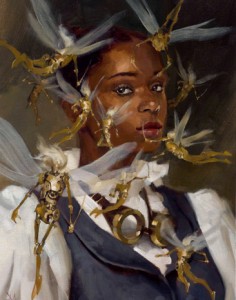 So I read a book recently and I loved some parts of it and other parts…not so much. And I’ve been thinking about it ever since because there was one part of it I just adored but I don’t feel like I could tell anyone to read the book without a big “hey and you should watch out for this” addendum. I’d bounced off a previous book by this author with what was supposed to be grimdark but had a big ol’ weirdly ungrimdark gendered cliché early on that made me think so hard about it that I couldn’t pay attention to the rest of the book, so I was already a little cautious, yet optimistic because I knew the author to be a good writer.
So I read a book recently and I loved some parts of it and other parts…not so much. And I’ve been thinking about it ever since because there was one part of it I just adored but I don’t feel like I could tell anyone to read the book without a big “hey and you should watch out for this” addendum. I’d bounced off a previous book by this author with what was supposed to be grimdark but had a big ol’ weirdly ungrimdark gendered cliché early on that made me think so hard about it that I couldn’t pay attention to the rest of the book, so I was already a little cautious, yet optimistic because I knew the author to be a good writer.
I’ve talked before about reading when the protagonist is markedly not you, and how used to it women — and other members of the vast majority the mainstream media calls Other — become. And this was a good example of a very young, very male, very heterosexual book. Which God knows I’m not opposed to. I remain a huge fan of the Warren Murphy and Richard Sapir Destroyer series and Doc Savage was a big influence on me, growing up.
So why did this book hit me so hard in an unhappy place? Because it was so smart and funny and beautifully written and involved connected stories about a favorite city and magic, which are three of my favorite things. And because it had a chapter that was one of the best short stories about addiction that I’ve read, and that left me thinking about it in a way that will probably shape at least one future story.
And yet. And yet. And yet. Women were either powerful and unfuckable for one reason or another or else fell into the category marked “women the protagonist sleeps with”, who usually didn’t even get a name. Moments of homophobic rape humor, marked by a repeated insistence on the sanctity of the hero’s anus, and a scene in which he embraces being thought gay in order to save himself from a terrible fate, ha ha, isn’t that amusing. And I’m like…jesus, there is so much to love about this book but it’s like the author reaches out and slaps me away once a chapter or so.
Why? Because representation matters. At one point or another a writer needs to look at representation in their book, try to perceive what it is saying to readers, and make a choice about that. Authors may choose to offend or shock, sometimes in the name of social change, like Harriet Beecher Stowe’s Uncle Tom’s Cabin, John Steinbeck’s The Grapes of Wrath, or Harper Lee’s To Kill a Mockingbird. Or they may do so by pushing up against the boundaries of art, like James Joyce’s Ulysses, William S. Burroughs’ Naked Lunch, or Kate Chopin’s The Awakening. The list of books challenged for one reason or another is long and full of wonderful writers. But — in my opinion — stirring the shit isn’t a good reason.
Books shouldn’t be banned. Books should be discussed, argued about, and used to learn and advance. Certainly there are books to exist to offend and use it as a marketing technique. This is not a new phenomenon, and it’s something that some authors use to good financial effect, like the authors who promise not just that the reader will find themselves in the book but that by some strange alchemy they are sticking pins in SJW voodoo dolls and then something about salty tears blah blah blah. It’s interesting that in such cases, reading is unnecessary – it’s the act of financial consumption that matters, and whether or not one tweets to signal one’s virtue.
Those are border cases, though. Most books just want people to read them and prefer to entertain over outrage. I’m about 95% sure the book that provoked this piece wasn’t intended to be edgy in its reinforcement of 1960s upper-middle-class American gender norms. It’s simply its take, a particular point of view that is not universally inherently tiresome except that it’s been a facet of the mainstream narrative for so long.
With the development of indie publishing, perhaps we’ll see a continued splintering of that narrative as well as a move to look backward in order to find the neglected, hidden, alternate texts that show an alternative viewpoint. As more and more readers look for the works that reflect their lives or at least don’t use their experiences for derogatory humor, those works emerge: G. Willow Wilson’s version of Ms. Marvel as an American Muslim teen, Charles Saunders or Steven Barnes‘ reimagining of traditional stories, Octavia Butler’s deeply uncomfortable and compelling Kindred, Yoss’s vision of a Spanglish-speaking universe. And more: stories that feature protagonists who are mentally ill, outside traditional body norms, or outside the narrow straight/cis arc of the gender spectrum. Here’s hoping, at least, for more and different lands in which we can all find ourselves.





